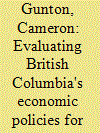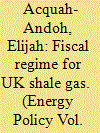| Srl | Item |
| 1 |
ID:
177442


|
|
|
|
|
| Summary/Abstract |
Interest in developing liquefied natural gas (LNG) has recently increased with global demand rising at a higher rate than any other fossil fuel in the last ten years. While the increase in demand for LNG has created an opportunity for countries with natural gas stocks, there is a significant amount of competition among these producing countries. As a result, jurisdictions have been implementing policies and subsidies to enhance their competitiveness in the global LNG market. We investigate the impact of this phenomenon in one gas-rich region, British Columbia, Canada, where the provincial government has promoted the development of a large-scale LNG industry. Drawing from staple theory, we explore how government policy has been shaped by the needs of the resource sector to provide incentives for expansion without undertaking comprehensive evaluation of the costs and benefits. As a result, the benefits of the expansion are overestimated, while the costs are underestimated. Our analysis shows that a more comprehensive and transparent evaluation of resource development policies is necessary to avoid suboptimal policies and ensure that development is in the public interest.
|
|
|
|
|
|
|
|
|
|
|
|
|
|
|
|
| 2 |
ID:
175257


|
|
|
|
|
| Summary/Abstract |
The UK is believed to hold prolific reserves of shale gas; the quality of which has been compared and sometimes branded superior to the much successful US shale plays. Nonetheless, after more than ten years since the 13th Onshore Licensing Round, the fracking industry is said to have benefited from just £400 million - £500 million of estimated investments and only one partially fracked well with yet an uncertain fate of commercial production. This paradox motivated the current research. Based on a discounted cash flow model, the economic feasibility of the tax regime was evaluated with a special interest in the pad allowance [PA], a major incentive of the fiscal regime. We find that the design of the fiscal regime well achieves the Government's financial objectives, but fails to support shale gas investments at lower gas prices. PA introduces further variability in investor cash flows, ultimately defeating the ethos of the incentive. We propose a reduction in the overall tax rate from 40% to no more than 21%; a removal of the additional tax charge (Supplementary Charge) and an amendment of PA rules to; (1) allow an extension of RFES to PA; (2) permit transfer of activated PA across companies in the same group; and (3) redefine capital expenditure to include intermediate well retirement costs necessary to drill new wells to stimulate production. Such a tax strategy would simplify and align the UK fiscal regime with practices across the US, China, Algeria and Canada. Importantly, it would better match the risk of shale gas investments to its rewards and could better attract investments. We recommend the strategy for emerging unconventional oil and gas producing countries for an efficient design of their fiscal regimes.
|
|
|
|
|
|
|
|
|
|
|
|
|
|
|
|
| 3 |
ID:
127190


|
|
|
|
|
| Publication |
2014.
|
| Summary/Abstract |
After 40 years of oil investments, the UK is now a mature oil province. During these 40 years or so, the UK Government has changed the type of governance it uses to manage its petroleum resources. This paper introduces the theoretical background to two models of mineral resource governance: proprietorial and non-proprietorial regimes. It investigates how adoption any of these two models by the UK Government has historically affected the achievement of the objectives of the UK petroleum fiscal regime. The analysis tracks the changes in the governance of the UK petroleum resources using changes in the average petroleum tax rate, and how this last influenced the achievement of the objectives of the UK petroleum Regime. The findings remain significant for their policy implications. The study concludes that the UK Government adopted a proprietorial type of mineral governance during the period 1975-1982, before changing to a non-proprietorial regime in the period 1983-2000. Since 2000 it has begun to move back towards a proprietorial style of governance. The excessive use of one type of these modes of governance leads to the objectives of the UK petroleum fiscal regime being not met.
|
|
|
|
|
|
|
|
|
|
|
|
|
|
|
|
| 4 |
ID:
166925


|
|
|
|
|
| Summary/Abstract |
The government needs to consider risk when designing a fiscal regime and oil companies need to assess prospect's risks when facing investment decisions. This paper analyzes how the fiscal regime dictates the risk-reward partition between companies and the government in a portfolio of prospects. The expected monetary value is provided as the decision criteria, and a decision model is presented where all the prospects are graphically represented. The fiscal regime's contract is generalized as a mathematical function and plotted together with the exploratory opportunities. This type of representation helps the policymakers to fine-tune petroleum contracts. It is also of great value to companies because it helps to understand the risks and rewards of a portfolio. We used the recent Brazilian fiscal regime change from a royalty and tax contract (R/T) to a partition share contract (PSC) to understand the impacts of the fiscal regime in the risk-reward balance of the prospects located at the recently discovered Pre-Salt geologic province offshore Brazil. We show how the policymakers can fine-tune the fiscal regime and how companies can better understand the contracts considering both the rewards and the risks involved.
|
|
|
|
|
|
|
|
|
|
|
|
|
|
|
|